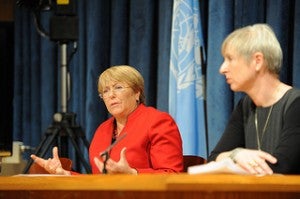Press statement by Michelle Bachelet at first press conference for CSW57
Date:

PRESS REMARKS
Michelle Bachelet, UN Under-Secretary-General and Executive Director of UN Women
4 March 2013
Thank you all for being here today. I have just come from the opening of the 57th Commission on the Status of Women. This is a critical meeting. As you know, the theme is ending violence against women. This meeting provides us with a very unique opportunity. That is the opportunity to show courage, action, determination and the heart it takes to do all we can to put an end to this violation of basic human rights and dignity.
All of us have witnessed in recent months that violence against women and girls remains a horrific reality. It takes place in every country and in all settings. It is a universal problem that requires a universal response. Public outrage is rising.
This is what the statistics tell us:
Up to seven in ten, yes 70 per cent of women globally, will be beaten, raped, abused, or mutilated in their lifetimes. This pandemic strikes the lives of millions of women, fractures families and communities and impedes development, costing countries billions of dollars each year in healthcare costs and lost productivity.
I really cannot say it strongly enough – The 21st century has no place for violence and discrimination against women.
Yet this violence continues in spite of significant progress that has been made in laws and policies. Today 187 countries have ratified the Convention on the Elimination of all Forms of Discrimination against Women. The UN Security Council now recognizes sexual violence as a deliberate tactic of war. One hundred and sixty countries have laws to address violence against women. And 125 countries have specific laws that penalize domestic violence. Yet 603 million women still live in countries where domestic violence is still not considered a crime. And impunity is still the norm, rather than the exception.
The main drivers of ending the pandemic of violence against women and girls worldwide are Governments. The 57th session of the Commission on the Status of Women is therefore an extremely important meeting for which expectations are very high. I think it is fair to say that the world and its citizens are watching.
As Executive Director of UN Women I have placed high priority on personally dialoguing with heads of State, countless ministers, civil society organizations, and private sector partners to encourage stronger action. Women and girls everywhere need Government leaders to take action, to assure their citizens that they will come through on the promises they made and negotiate a global roadmap of actions to prevent and end this violence.
Ten years ago, nations came together in this forum on this very same issue; they were unable to reach agreement. Today, we simply cannot afford to allow disagreement and indecision to block progress for the world’s women. Political will is key to progress.
To foster that political will, in November last year, UN Women launched COMMIT.
The initiative called on Governments to commit to new, and above all, concrete national actions to end violence against women and girls. Today I am pleased to announce that 41 Governments have committed as of now, and we expect more this week.
You can find the commitments on the website: www.saynounite/commit and we have information here with the names and commitments of countries.
I salute the Governments that have committed to their citizens to take action to end violence against women and girls.
These Governments have committed to a range of efforts for prevention, protection and justice, such as more effective laws and national strategies, stronger prosecution of violence cases, advocacy campaigns targeted to young people and men, trainings of civil servants to detect violence cases, and expanded public services, such as the shelters. All these efforts are so essential, and so urgent.
We have great hope that the Member States will show that determined leadership and the political will this time to push the international agenda on ending violence against women.
This meeting is the opportunity to show commitment to the countless women and girls – to the Malala’s, to the gang rape victims of our world, whom we have no right to forget, and to all women and girls.
We would like to see two main actions in the agreed conclusions:
Member States strengthening global norms and standards; and increasing political commitment and action to end the pandemic.
We strongly believe it is possible to end this pandemic of violence against women through determined leadership for prevention, protection and provision of services for survivors.
The women and girls of the world are counting on us. We have no right to fail them.
I look forward to your questions.
As of noon, 4 March 2013, 41 Governments have committed to concrete measures to end violence against women, including:
1) Albania
2) Australia
3) Austria
4) Belarus
5) Bosnia and Herzegovina
6) Brazil
7) Canada
8) Denmark
9) Dominican Republic
10) Fiji
11) Finland
12) France
13) Germany
14) Georgia
15) Greece
16) Guatemala
17) Hungary
18) Jamaica
19) Japan
20) Liberia
21) Mexico
22) Morocco
23) Nepal
24) Netherlands
25) Nigeria
26) Occupied Palestinian Territory
27) Papua New Guinea
28) Poland
29) Qatar
30) Republic of Korea
31) Serbia
32) Slovakia
33) Spain
34) Sweden
35) Thailand
36) The Former Yugoslav Republic of Macedonia
37) Togo
38) Tunisia
39) Turkey
40) United States of America
41) Viet Nam